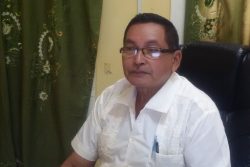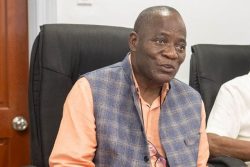On Thursday President Irfaan Ali travelled to Berbice and told the assembled crowd in New Amsterdam that the Office of the President would operate out of a different region every month for two days. This was in order, he said, “that we can be in touch with you so you can feel the highest office at your disposal and have easy access to the highest office.” Since the advent of his government, he went on to tell them, “we have been going to you, we’re not waiting for you to come.”
Accompanying him were technical teams from the Ministry of Housing and Water, the Ministry of Human Services and Social Security; the Ministry of Local Government and Regional Development; the Ministry of Education; the Ministry of Agriculture; the National Insurance Scheme; the Guyana Office for Investment; the Guyana Revenue Authority; the Guyana Lands and Surveys Commission; Guyana Power and Light; and the Guyana Online Academy of Learning (GOAL). In other words, he took in tow, if not the entire government, a significant segment of it.
Some of what he had to say related to central government issues, such as the building of a modern stadium as well as a motor racing track, a recreational centre, a hospital, a centre for persons with disabilities and possibly an oil refinery. There was also mention of a hotel, a state-of-the-art mall and a call centre, although whether the intention was that government should be responsible for these kinds of projects rather than the private sector was not stated. If the former, one might have thought the administration would have learned its lesson from the Marriott Hotel. In any case, in a general sense the less government trespasses into the arena normally associated with free enterprise, the better. Be that as it may, it was announced that over $10 billion was anticipated to be expended in private and public investments.
President Ali is not the first head of state to have it in mind to take government to the people. Forbes Burnham was the first to try it, although he did not have the advantage of the technology to which the current incumbent has access and which allows for a level of speed in addressing problems that was impossible forty years ago. However, the principle remains the same. The President insisted to his audience that the initiative was not about passing the buck from the regional institutions, but rather bringing the heads of agencies to the regions so the process could be fast-tracked.
He indicated that he wanted citizens to avoid the “bureaucracy or hassle,” so that “At the end of the day, you’ll have a direct connection with my office to resolve your issues.” Staff from his office, he said, would follow up the matters thus removing that burden from citizens, and we reported him as going on to say that this would strengthen governance, improve its efficiency and enhance the delivery of services to citizens throughout the country.
If that is what he believes, then he is mistaken. If anything, such an approach is indicative of a failure of current government. Modern democracies especially are complicated political organisms which require a welter of ministries, agencies and local government bodies to be able to function effectively. One man and his office cannot govern the entire country attending to every problem large or small in all regions; that is a recipe for stasis at best, not progress, and if it goes on for long enough will end in public dissatisfaction, not satisfaction.
Bypassing the agencies which are supposed to deliver services by arranging to have those services delivered on a regional presidential visit two days a month, means that officials will do less than they did before. They will stand back and let the President’s Office deal with all the issues not to mention the problems. This is the opposite of what is supposed to transpire, which is for governmental and associated institutions to work better all the time. That will not happen if they do not have to take responsibility for their own actions and decisions; they will simply wait until contacted by the Office.
Furthermore, it entrenches the view among the populace that to get anything accomplished at all when dealing with officialdom, one must appeal to the highest level possible. Now what will happen will be that no one will bother with the responsible agencies, they will just wait until the President and/or his Office appear in the relevant region to register their problem. They might even be tempted to come down to Georgetown to the Presidential Secretariat. Then what will the President do? Send them away? That apart, the head of state might soon find his Office is swamped. What are they doing dealing with NIS queries or tax complaints? Surely those things should not be in the direct remit of a presidential bureaucracy.
This government already has a bad record when it comes to bypassing local government especially, particularly if a given entity is in the hands of the opposition. But now, it seems, centralisation is being taken a step further since it will affect at least some of the central ministries and specialised agencies such as Lands & Surveys. And since it seems to be taking on GPL matters as well, it will have its work cut out for it.
We reported the President as noting that they were able to deal with over 100 complaints about roads, bridges and sea defence structures across Region Six. “As a result of this, we already have engineers on the ground working to fix some of the important problems,” we quoted him as saying. Roads and bridges come within the purview of regional and local government, and if there are problems with an authority in respect of these, for example if a Regional Executive Officer who is appointed by the government omits them from the regional budget, then that should be investigated. If the officer is at fault he will have no incentive to improve his performance if the President’s Office then swoops in and arranges to get everything fixed. The same applies in the case of all the other local government officials.
As for the sea defences, there must be a better form of communication with the Sea Defence Board than waiting for the President to come. Sea defences are critical to our survival as a country, and if there isn’t a system in place for constant monitoring and communication when something is amiss, then there is a serious problem which will not be solved by the appearance of the Office for two days in the coastal Regions every few months.
Guyana has many problems not all of which are directly related to our ethno-political dilemma. It has a serious human resource deficit in terms of competence, something which is much in evidence at the local level in particular. It lacks autonomous institutions which can monitor government decisions and the actions of private entities such as the oil industry, as well as guard against corruption and alert the relevant authorities when it is identified. Those which do exist, more especially the EPA, it has emasculated. This government and this President particularly are allergic to criticism, no matter how qualified the source, and will not engage those who belong outside its magic circle in any meaningful way. The head of state is also to all appearances averse to press conferences and exposing himself to questioning by the media.
In the first instance a working democracy is about having the right structures in place as well as the necessary checks and balances in the system. If these are not there, then it does not matter how many NIS problems the President solves, the country will not be truly democratic. Yesterday we reported that the Economist Intelligence Unit had rated Guyana as a flawed democracy which had fallen two points on the world global democracy index. In this region we fall below Trinidad, Jamaica and Suriname, and the only country we are higher than is Haiti. There are four categories in the index: Full Democracies, Flawed Democracies, Hybrid Regimes and Authoritarian Regimes. Our highest rating was for civil liberties and the lowest for political culture.
It is not an assessment which will surprise everyone here. Transparency International also reported recently, that where perceived corruption was concerned Guyana remained far behind the leaders in the region, namely Barbados and The Bahamas, and once again the only Caricom country we were ahead of was Haiti, although we had moved up one place in the rankings from last year.
It is not just that circumventing institutions which are enshrined in the Constitution or set up under statute will not enhance democracy, it is too that the President’s modus operandi will undermine the capacity of the state to function, which is the opposite of what the head of state intends. There is no harm in the President visiting communities from time to time and listening to their concerns; in fact it will be beneficial for them to get to know him and feel he is approachable. It is a different matter, however, when that is institutionalised to become a mechanism for running the country.








